#Ming dynasty in 1566
Explore tagged Tumblr posts
Text

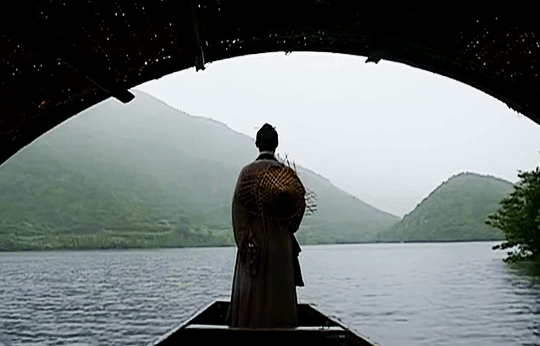
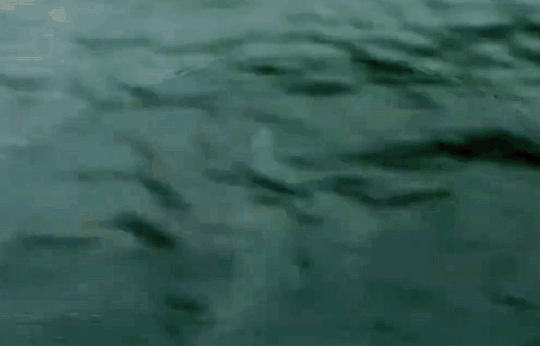

In the 40th year of Jiajing, 1561 AD, Hai Rui became Magistrate of Chun'an. From the moment he reported to the governor's office in Hangzhou, he was committed to the ceaseless war against the forces of corruption.
MING DYNASTY IN 1566 / 大明王朝1566 • EPISODE 6
38 notes
·
View notes
Text

5 YEARS IN ADVANCE??? i'm astonished the peasants aren't already burning down government buildings
46 notes
·
View notes
Photo
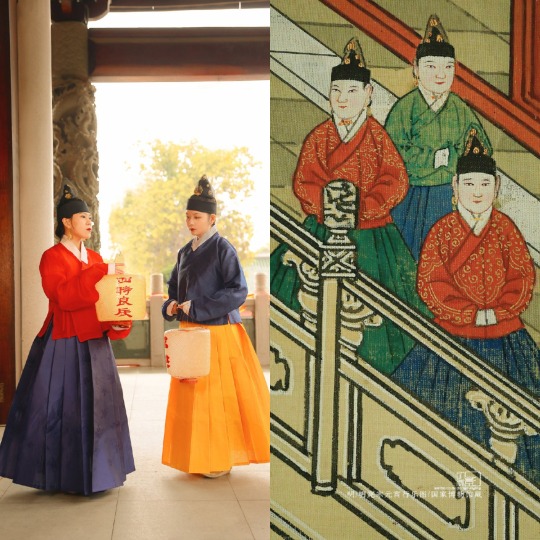
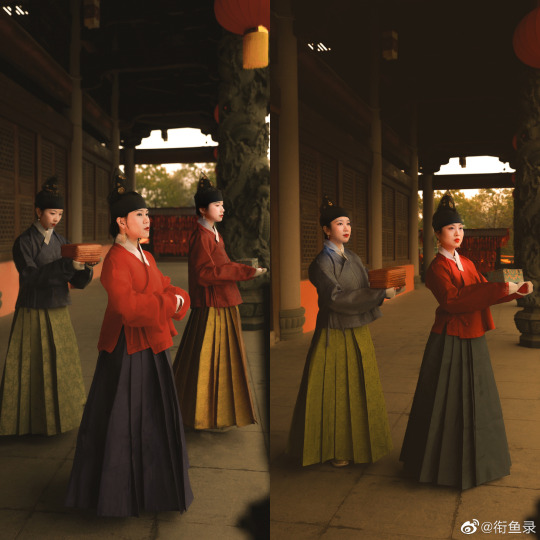



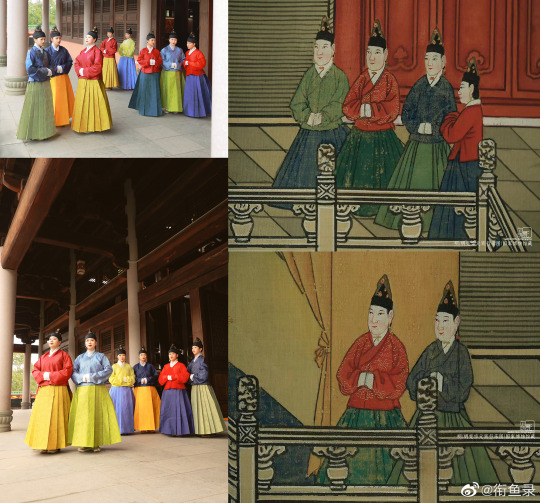

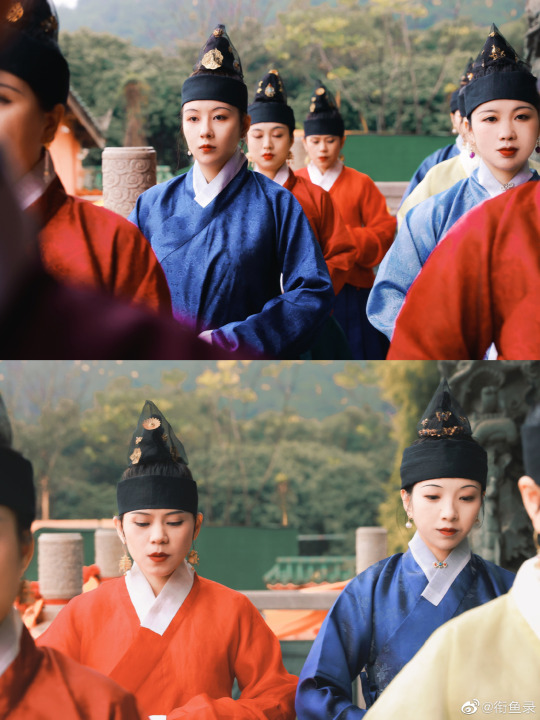
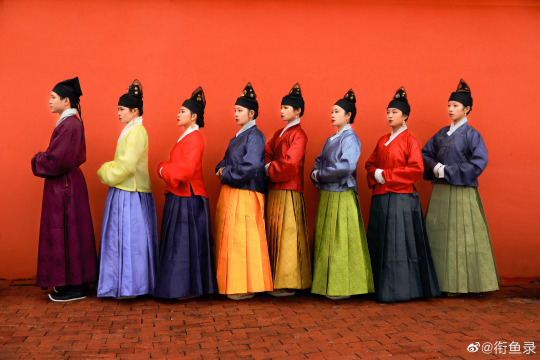
【历史文物参考】
Chinese Ming Dynasty Painting(1485 CE):【明宪宗元宵行乐图/Ming Emperor Xianzong Enjoying the Lantern Festival (part)】showing court lady in the ming dynasty
※ Women with gold patterns in Hanfu (top) had titles/rank in the court of the Ming Dynasty, and they may be imperial concubines, princesses, etc.
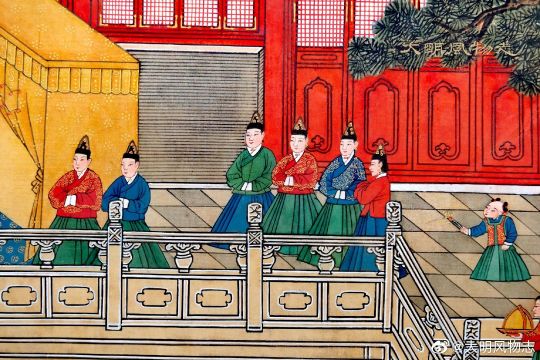
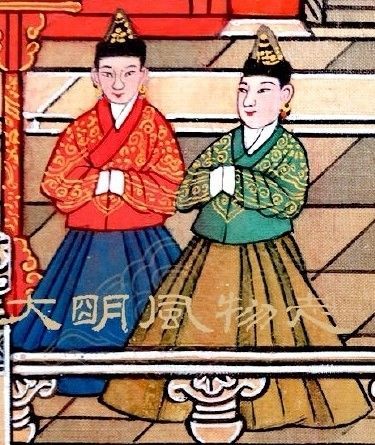
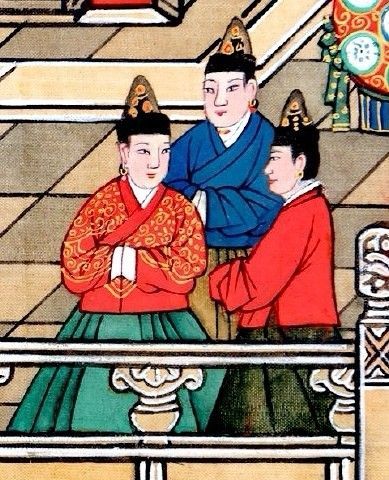


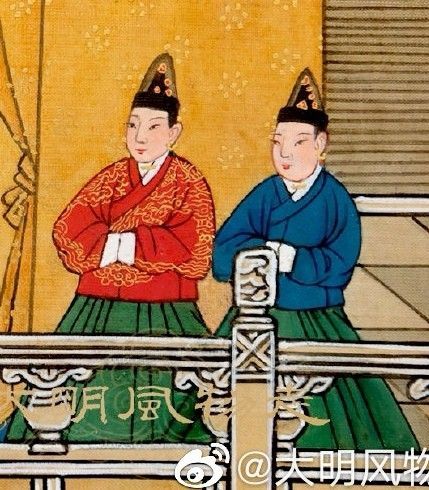
[Hanfu · 汉服]Chinese Ming Dynasty Chenghua era(1465-1487 AD) Traditional Clothing Hanfu & Hairstyle
【About horsehair skirt (马尾裙) petticoat】
A horsehair petticoat (马尾裙) is a petticoat that is worn under the skirt to give it a puffy appearance. This kind of petticoat came from Korea Joseon at that time.
❗ However, it would be wrong to say that the entire outfit above is Korean origin as someone claim.
In Ming Dynasty record "寓圃杂记/Yu Pu Notes" By Wang Kai王锜 emphasizes that this style of clothing (马尾裙horsehair petticoat) is a kind of ominously strange clothing , which is what the ancients called "服妖(A derogatory term that describes people wearing weird clothing is bad symbol)". It is only popular among rich and uneducated people, and will let decent people look down on, the original words are " 然系此者惟粗俗官员、暴富子弟而已,士夫甚鄙之,近服妖也 "
Horsehair petticoats are popular in Beijing. Demand was low at first, and local production was impossible and unnecessary. They are all imported from Korea Joseon. When it becomes popular, even men like to wear horsehair petticoats under their robes, and the demand and market will naturally increase, so localized production began. But the number of horses is limited, and the most important raw material, horse hair, is not easy to obtain.
So some people went to the army camp to steal the horse hair of the army horse, which made the army horse look thin and bad.
❗In the Early Emperor Hongzhi era,the officials reported these incident to the Emperor Hongzhi(1470-1505)of the Ming Dynasty said”京中士人好著马尾衬裙,因此官马被人偷拔鬃尾,有误军国大计。乞要禁革”Saying that such behavior is not good for the country and suggest to ban horsehair petticoat. So Emperor Hongzhi make an order to banned people wearing Horsehair petticoats
Since then, this horsehair petticoat gradually disappeared from China history
❗ It is worth mentioning that even in the period when horsehair petticoats were popular, not everyone wore horsehair petticoats, as shown in the book "释氏源流应化事迹" in the Chenghua era of Ming Dynasty (AD 1465-1487): ( Women that not wear horsehair petticoats)
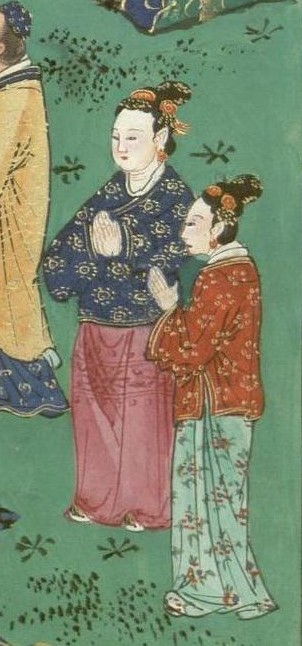
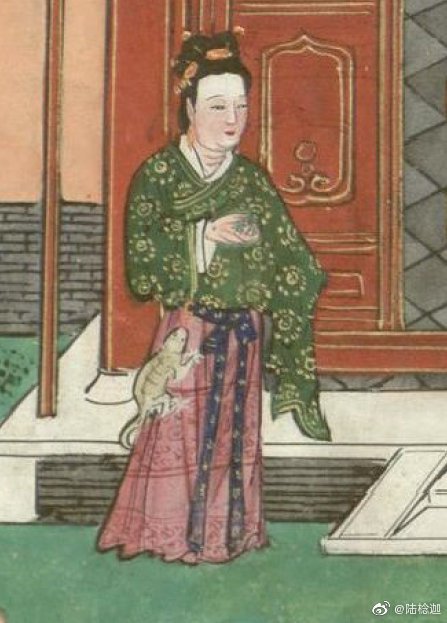
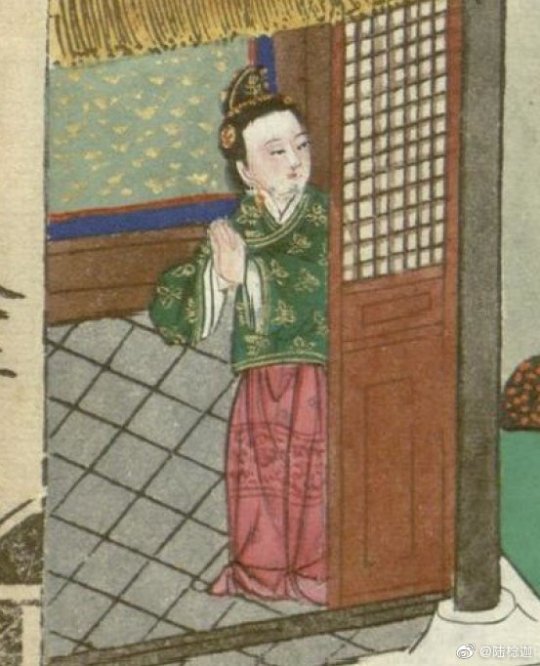
After Emperor Hongzhi banned the wearing of horsehair petticoats (back to the silhouette of Hanfu in the Ming Dynasty), as shown below
Murals in the tomb chamber of Zhengde period (1506-1521) - Jiajing period (1522-1566)::
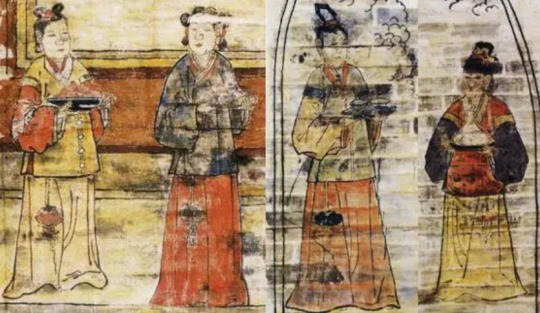
_______
💡 Produce: @衔鱼录
📸Photo: @超级方便MAN
🎥Post-production : @还是叫我雪影吧
🔖Hanfu Research: @玩泥巴的豆角 @邈邈阁的颜掌柜
🧚🏻 Model : @还是叫我雪影吧 @曾嚼子 @记不住密码的小基崽 @NanFu_南赋吖 @玩泥巴的豆角 @纭澈 @言言衍晏 @子可_POTTERY @祁祁萝祁萝贰祁
💄Makeup Director: @还是叫我雪影吧
🧵Tailor: @邈邈阁的颜掌柜
🏮Lantern provider: @纭澈
CC organization: @南宁汉服小组 @汉洋折衷bot @大朙时尚搭配频道 @大明穿搭bot @说给大明服饰
🔗微博:https://weibo.com/3962795866/MrDftbHIT
_______
#chinese hanfu#Ming Dynasty Chenghua era(1465-1487 AD)#hanfu#chinese traditional clothing#chinese fashion history#China History#chinese#historical fashion#historical hairstyles#Chinese Costume#chinese culture#hanfu accessories#hanfu history#Zhengde Emperor era(1506-1521)#Jiajing Emperor era(1522–1566 A.D)#《释氏源流应化事迹》#寓圃杂记/Yu Pu Notes#明宪宗元宵行乐图/Ming Emperor Xianzong Enjoying the Lantern Festival#汉服#漢服#Horsehair petticoats
301 notes
·
View notes
Text
halfway through episode 8, the new official who's a slut for fine art (Gao ...Personal Name? The one that's not Gao Gong.) attempts to exit the interior of the pitcher plant he's been sitting in all day
"oh but my lord, it's the hour of the cock, please come teach my beautiful niece the right way to play her quim qin before you leave"
7 notes
·
View notes
Text
I'm watching Ming Dynasty 1566 and it's great so far! I'm fully enarmored. It's all policy, bureaucracy, and procedure (and schemes but you need those to drive home the beauty of procedure). This is what every show should be like, I love it.
#I'm the kind of Star Wars fan that wanted the prequels to elaborate more on trade laws#and to have extensive debates on who should be Chancellor and so on and so forth#bureaucracy my beloved#ming dynasty 1566
5 notes
·
View notes
Text
The speed with which I put this on my watchlist! Thank you Ming Dynasty 1566 OP!
I’m gonna pitch a show as “like Game of Thrones but even more gritty and realistic” and then it’s nothing but a baron handling land estimates and organizing road repairs and stuff. There’ll be an entire episode about how a peasant gets brought to court for letting milk cattle graze on communal pastureland even though it’s supposed to be reserved for draft animals.
52K notes
·
View notes
Text
truly obsessed with ming dynasty in 1566. a bunch of morally bankrupt men whose dicks don’t work all trying to kill each other through weaponized budgeting. WITH footnotes
103 notes
·
View notes
Text
So I came across a clip of this amazing scene from Ming Dynasty 1566, and love the composition of the shot with the prime minister (Zhang Juzheng) calmly leading the young emperor into the palace as snow falls gently around them. The vibes are immaculate. The powerful prime minister and the child emperor completely dependent on him. Teacher, father-figure, prime minister. The emperor’s guardian and keeper. The man he loves and fears most. Ahhhhhhhhhhhhh
(And I am totally stealing this for my Liu Shan x Zhuge Liang fic)

15 notes
·
View notes
Text
Watching some Ming Dynasty 1566 got my brain going.
Game where players are all high-ranking ministers in an empire that's a little past its prime. Each has their own portfolio: Agriculture, Army, Infrastructure, Navy, etc.
Each round some number of events (drought, bountiful harvest, typhoon, barbarian invasion, etc) get drawn, players allocate their budget between governence and embezzlement, as well as special event-dependent actions. Embezzled money goes straight to victory points, while imperial favor is more unpredictable and lower ROE on average, but stealing too much can cause problems to rapidly build up for you down the road.
Add to this a "Network" mechanic, where you have a randomized bilateral relationship with other players, and partially share in their successes and failures.
E.G.: strategic interactions mean the Minister of the Army might demand too much manpower from the Minister of Agriculture to intentionally either cause a crisis if refused or a famine if approved.
Expansion could have a Minister of Finance who centrally allocates budgets and weighs in on events, becomes most powerful position but possibly easiest to gang up on?
11 notes
·
View notes
Text
Ming Dynasty in 1566 is so plot-heavy, so information-dense... I think the court secretaries need a beach episode
11 notes
·
View notes
Text
watching ming dynasty in 1566: oooooh this drama is very interesting! i wonder when it’s set 🤔
#it’s possible that I am an idiot#BUT i highly resent how quickly the gc agreed with me when I said as much 😒#ming dynasty in 1566#大明王朝1566#anyway I watch about three episodes of this every six months and then run out of steam. I really like it though!
0 notes
Text
Me: "Hm now that I've decided to hold back my annual rewatch of The Terror to winter I should give @witchysolfan's recommendation of Transformers: Prime a second try."
Also me: "omg the consequences of converting farming land into mulberry land for the production of silk in Ming Dynasty 1566 are going to be messyyyyyyy."
#sorry witchy#got sucked into another political drama first asfgrfefagd#that said#1 and 1/2 episode in & having a lot of fun watching the setup for the terminal decline of a dynasty on account of the rot being too deep lo
3 notes
·
View notes
Text
most difficult of all government tasks: putting hat on baby
10 notes
·
View notes
Note
I have barely watched any cdrama, so maybe someone with more exposure to them can help explain this. It's something with the visual language of that cinema (I assume; for all I know it's just something an one director likes to do), but I can't understand what it's meant to convey.
The images "blinks", that's the best way I can put it; like it fades to black on a shot, fades back in, fades back out and in a few times. In the stuff I'm used to seeing, this would be visual language to convey that a character is passing out, or otherwise in an altered state of consciousness; however, that's not what's happening here. I think it MIGHT be used for emphasis, but I don't know what KIND of emphasis (eg a dun-dun-DUN and a *crickets chirping* are both audio cues used to emphasize something, but they have VERY different meanings).
For the record, I saw this in the few episodes of Ming Dynasty 1566 which I watched before deciding that it wasn't for me; so I also didn't have context for, ah, pretty much all of the story and setting (I know Extremely Little about Chinese history), so I wouldn't have picked up on why a given moment would be considered so impactful. Plus I have problems recognizing faces so even character beats are confusing to me.
-
3 notes
·
View notes
Text
I am on episode 13 of 46, and there have already been at least 3 separate instances of men dramatically fainting in the middle of a meeting
4 notes
·
View notes